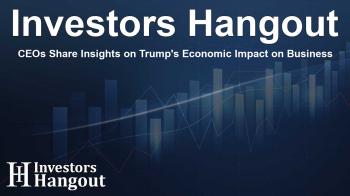CEOs Share Insights on Trump's Economic Impact on Business

CEOs Express Dilemmas Regarding Economic Policies
In a recent closed-door meeting, more than 100 top business leaders, including the heads of Fortune 500 companies, gathered to voice their unified apprehensions regarding the economic implications of President Donald Trump's policies. This alarming collective sentiment sheds light on the challenges faced by the business community in navigating these turbulent waters.
Concerns Over Tariffs and Economic Consequences
During the 155th Yale Chief Executive Leadership Institute’s CEO Forum, the assembled CEOs outlined their worries about the short-term benefits versus the long-term ramifications of Trump’s policies. Despite their different political views, they expressed common fears about the erosion of the U.S. economic framework. Their concerns extend beyond mere business profits to the very fabric of national security, indicating how critical agencies like the FBI, CIA, and the Pentagon could inadvertently influence the country’s global positioning.
Negative Effects of Tariffs on Businesses
A significant finding from the discussions was that two-thirds of those surveyed believed U.S. tariffs have adversely impacted their operations. Many CEOs estimated that 80% of tariffs are being equitably distributed among domestic companies and U.S. consumers, while the remaining burden is carried by foreign counterparts. To mitigate these steep costs, businesses have begun rerouting supply chains and adjusting their operations — some have had to implement hiring freezes and, in unfortunate cases, layoffs as well.
The Reality of Manufacturing Expectations
Despite the administration's intentions to revive U.S. manufacturing, crucial voices among the CEOs pointed out the unrealistic nature of expecting every industry to exclusively produce goods in the U.S. for local consumption. They emphasized, “It is not realistic to expect every industry in the world to be manufacturing products in the U.S. for the U.S.,” highlighting the difficulties amid global competition.
Citing Historical Challenges
Reflecting on the state of U.S. manufacturing, the CEOs articulated their concerns about a marked decline, noting that U.S. manufacturing firms have diminished by 25% between 1997 and 2022, largely due to globalization and trade deals. This decline has fueled the ongoing apprehensions amongst business leaders about the long-term viability of American manufacturing.
Worker Shortages Amid Manufacturing Aspirations
As they look toward the future, the anticipated manufacturing renaissance, projected to create nearly 4 million new factory jobs by a certain year, faces a critical barrier: a severe lack of interest among younger workers in these roles. Studies reveal that as little as 14% of Gen Z is considering a career in industrial work, which poses a significant challenge for the revival of the manufacturing sector.
Mismatch Between Public Perception and Career Choice
Despite a majority of Americans, around 80%, believing that the nation would benefit from an increase in manufacturing jobs, only 25% are directly interested in pursuing such positions. This inconsistency emphasizes the gap between public opinion and personal job preferences, suggesting a need for more education and adjustment within the labor market.
Engaging with Corporate Leaders for Solutions
As the economic climate evolves, consistent engagement with corporate leaders is imperative. Companies like Ford Motor Co (NYSE: F), Gap Inc (NYSE: GAP), Nike Inc (NYSE: NKE), and Walmart Inc (NYSE: WMT) have raised similar alarms about the future landscape of business under the current policies. There’s an evident call for a collective response to shape a more stable economic environment.
Frequently Asked Questions
What are the main concerns voiced by CEOs regarding Trump's policies?
CEOs primarily voiced concerns about tariffs, national security erosion, and unrealistic expectations for manufacturing solely in the U.S.
How have tariffs affected businesses according to the CEOs?
Two-thirds of CEOs indicated that tariffs have negatively impacted their operations, leading to increased costs shared between domestic firms and consumers.
What challenges do manufacturing sectors face today?
The manufacturing sector faces worker shortages, with a significant portion of Gen Z showing limited interest in pursuing industrial careers.
Why do CEOs believe reviving manufacturing is unrealistic?
Many CEOs pointed out that expecting all industries to produce goods exclusively in the U.S. is unrealistic due to global market dynamics.
How are CEOs responding to the current economic climate?
CEOs are adjusting their strategies by rerouting supply chains, implementing hiring freezes, and exploring various operational shifts to adapt to economic pressures.
About The Author
Contact Hannah Lewis privately here. Or send an email with ATTN: Hannah Lewis as the subject to contact@investorshangout.com.
About Investors Hangout
Investors Hangout is a leading online stock forum for financial discussion and learning, offering a wide range of free tools and resources. It draws in traders of all levels, who exchange market knowledge, investigate trading tactics, and keep an eye on industry developments in real time. Featuring financial articles, stock message boards, quotes, charts, company profiles, and live news updates. Through cooperative learning and a wealth of informational resources, it helps users from novices creating their first portfolios to experts honing their techniques. Join Investors Hangout today: https://investorshangout.com/
The content of this article is based on factual, publicly available information and does not represent legal, financial, or investment advice. Investors Hangout does not offer financial advice, and the author is not a licensed financial advisor. Consult a qualified advisor before making any financial or investment decisions based on this article. This article should not be considered advice to purchase, sell, or hold any securities or other investments. If any of the material provided here is inaccurate, please contact us for corrections.

